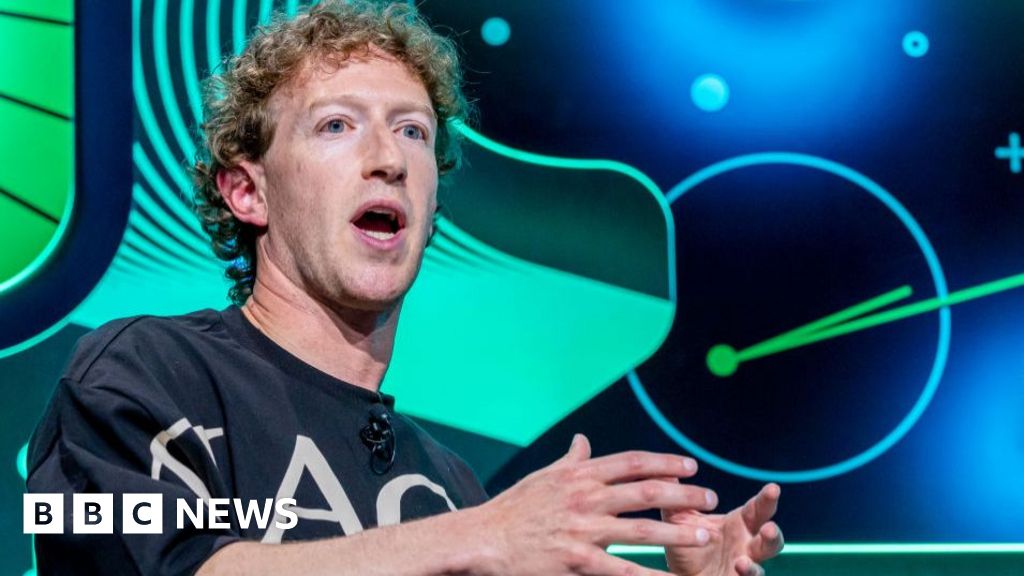Meta is abandoning the use of independent fact checkers on Facebook and Instagram, replacing them with X-style “community notes” where commenting on the accuracy of posts is left to users.
In a video posted alongside a blog post by the company on Tuesday, chief executive Mark Zuckerberg said third-party moderators were “too politically biased” and it was “time to get back to our roots around free expression”.
The move comes as Zuckerberg and other tech executives seek to improve relations with US President-elect Donald Trump before he takes office later this month.
Trump and his Republican allies have criticised Meta for its fact-checking policy, calling it censorship of right-wing voices.
Speaking after the changes were announced, Trump told a news conference he was impressed by Zuckerberg’s decision and that Meta had “come a long way.
Asked whether Zuckerberg was “directly responding” to threats Trump had made to him in the past, the incoming US president responded: “Probably”.
Joel Kaplan, a prominent Republican who is replacing Sir Nick Clegg as Meta’s global affairs chief, wrote that the company’s reliance on independent moderators was “well-intentioned” but had too often resulted in censoring.
Campaigners against hate speech online reacted with dismay to the change – and suggested it was really motivated by getting on the right side of Trump.
“Zuckerberg’s announcement is a blatant attempt to cozy up to the incoming Trump administration – with harmful implications”, said Ava Lee, from Global Witness, a campaign group which describes itself as seeking to hold big tech to account.
“Claiming to avoid “censorship” is a political move to avoid taking responsibility for hate and disinformation that platforms encourage and facilitate,” she added.
Emulating X
Meta’s current fact checking programme, introduced in 2016, refers posts that appear to be false or misleading to independent organisations to assess their credibility.
Posts flagged as inaccurate can have labels attached to them offering viewers more information, and be moved lower in users’ feeds.
That will now be replaced “in the US first” by community notes.
Meta says it has “no immediate plans” to get rid of its third-party fact checkers in the UK or the EU.
The new community notes system has been copied from X, which introduced it after being bought and renamed by Elon Musk.
It involves people of different viewpoints agreeing on notes which add context or clarifications to controversial posts.
“This is cool,” he said of Meta’s adoption of a similar mechanism.
After concerns were raised around self-harm and depressive content, Meta clarified that there would be “no change to how we treat content that encourages suicide, self-injury, and eating disorders”.
Fact-checking organisation Full Fact – which participates in Facebook’s program for verifying posts in Europe – said it “refutes allegations of bias” made against its profession.
The body’s chief executive, Chris Morris, described the change as a “disappointing and a backwards step that risks a chilling effect around the world.”
‘Facebook jail’
Alongside content moderators, fact checkers sometimes describe themselves as the internet’s emergency services.
But Meta bosses have concluded they have been intervening too much.
“Too much harmless content gets censored, too many people find themselves wrongly locked up in “Facebook jail,” and we are often too slow to respond when they do,” wrote Joel Kaplan on Tuesday.
But Meta does appear to acknowledge there is some risk involved – Zuckerberg said in his video the changes would mean “a trade off.
“It means we’re going to catch less bad stuff, but we’ll also reduce the number of innocent people’s posts and accounts that we accidentally take down,” he said.
The approach is also at odds with recent regulation in both the UK and Europe, where big tech firms are being forced to take more responsibility for the content they carry or face steep penalties.
So it’s perhaps not surprising that Meta’s move away from this line of supervision is US-only, for now at least.
‘A radical swing’
Meta’s blog post said it would also “undo the mission creep” of rules and policies.
“It’s not right that things can be said on TV or the floor of Congress, but not on our platforms,” it added.
It comes as technology firms and their executives prepare for Trump’s inauguration on 20 January.
Several CEOs have publicly congratulated Trump on his return to office, while others have travelled to Trump’s Florida estate Mar-Lago to meet with the incoming president, including Zuckerberg in November. Meta has also donated $1m to an inauguration fund for Trump.
“The recent elections also feel like a cultural tipping point towards, once again, prioritising free speech,” said Zuckerberg in Tuesday’s video.
Meta notified Trump’s team of the policy change before the announcement, the New York Times reported.
Kaplan replacing Sir Nick – a former Liberal Democrat deputy prime minister – as the company’s president of global affairs has also been interpreted as a signal of the firm’s shifting approach to moderation and its changing political priorities.
The company also announced on Monday that Dana White, a close Trump ally and president of the Ultimate Fighting Championship, would join its board of directors.
Kate Klonick, associate professor of law at St John’s University Law School, said the changes reflected a trend “that has seemed inevitable over the last few years, especially since Musk’s takeover of X”.
“The private governance of speech on these platforms has increasingly become a point of politics,” she told BBC News.
Where companies have previously faced pressure to build trust and safety mechanisms to deal with issues like harassment, hate speech, and disinformation, a “radical swing back in the opposite direction” is now underway, she added.

